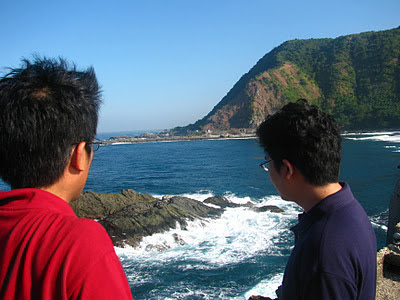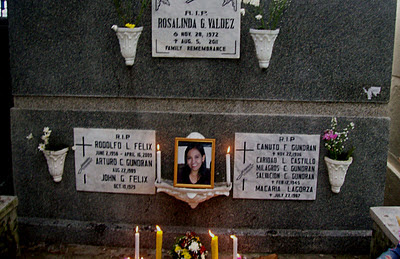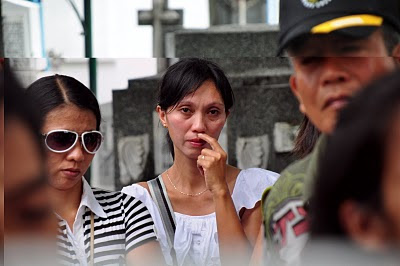OTHER than the scenic or rather memorable places of my hometown, one thing that made
me so eager to go home again, is the food.
Fortunately,
in my latest homecoming, I was not deprived of this rare opportunity to indulge
in as many of my favorite Ilocano food as I can. My family, particularly Manong
Ben and his wife Cion, were tireless in serving me the food that I crave so
much.
Good thing, Lloyd and Melchor, my classmates in PUP College of Law who joined me in my last visit to Narvacan, joined me in this gastronomic foray. My friends were only familiar with the popular pinakbet, dinengdeng, and the bagnet, while the rest of the Ilocano foods are exotic to them. That’s why I could see either a reluctance of a Fear Factor contestant or that why-not-try attitude when some of these foods were served to them.
Good thing, Lloyd and Melchor, my classmates in PUP College of Law who joined me in my last visit to Narvacan, joined me in this gastronomic foray. My friends were only familiar with the popular pinakbet, dinengdeng, and the bagnet, while the rest of the Ilocano foods are exotic to them. That’s why I could see either a reluctance of a Fear Factor contestant or that why-not-try attitude when some of these foods were served to them.
Life
was tough in Ilocos, but there was always food to give you a bit taste of
heaven. Oh my, I have always loved these foods that were served during my
homecoming.
Imbaligtad. This is my number one in the
list, because it has always been my usual request that my father would
cook one as a welcome treat for me everytime I arrive here for vacation. Unlike the papaitan, which
uses beef tripes and innards that are cooked over medium heat until
tender, our delicious imbaligtad
uses the freshest beef (laman or
any lean part). The beef is just stir-fried with garlic, ginger and onion,
and some hot chili to spice. Imbaligtad
literaly means flipped over (“binaliktad” in Tagalog), so the beef is just
quickly stir-fried at high heat on a few turns or flips. The effect is a steaming
half-cooked fresh meat that tastes sweet and not rubbery.
Sinanglaw.
This is a pinapaitan minus the bitter taste
of cow’s papait (a part of the stomach of a ruminant or a bile). Instead
of bitterness, it is sourness of sukang
Iluko (Ilocos vinegar) or a young tamarind (kamias can be an alternative) that dominates its taste. Thanks
to Manong Ben who ushered me and my friends to a well-known sinanglawan in
town, those found adjacent to the town hall, for a late-morning breakfast.
I haven’t tasted a real sinanglaw
(literally means “steamed” in the local dialect) for many years now,
although according to my father, that type of sinanglaw we ordered in town is just replication of the better
known Vigan sinanglaw which uses
meaty portions of the cow, instead of cow’s heart, large intestines,
tenderloin, lungs and skin that we usually do here in Narvacan. The
ingredients are cut in small sizes and stewed with ginger, onion and
pepper. For Melchor and Lloyd (who is from Batangas), sinanglaw tastes a lot like bulalo except the vegetables and
ginger-y taste.
Warekwarek.
This is
sometimes called dinakdakan by
the non-Ilocanos. It is usually made of grilled pig head and face, similar
to the Kapampangan’s sisig. Pork
inards or entrails are also used for our local warekwarek. But I like it best when it contains liver
(submerged in vinegar, not cooked or grilled) mixed with pig’s brain (or
mayonnaise as alternative ingredient), onions, pepper and sukang Iluko, and spiked with
calamansi. I usually prepare a dinakdakan
at home for my kids and they really love its taste. And sisig, which is very close to warekwarek in taste and
presentation, is my all-time favorite in carinderias. But whenever I have the chance to go back North I
always look for the original warekwarek
of my hometown.
Kilawing
kambing. The
real thing or Ilocano way of this kilawen
(eaten raw) uses the goat skin and meat, which is sliced into small sizes
or thin strips just after it is grilled. It is mixed with sukang Iluko and
finely chopped fresh onions and ginger, seasoned with salt and pepper, and
usually with the goat’s papait for more flavor. I always associate kilawing kambing with a big clan reunion in Ilocos. We can’t
have one without this favorite pulutan
of the Ilocanos. During my youth in barrio Nanguneg, I would always
help in the preparation, together with my brothers, cousins, and uncles,
from the pulpog
(burning off the hair of the carcass through fire) up to the slicing of the grilled meat
and other ingredients to the tasting and the ensuing tagayan or drinking
for celebration. That’s why for my father’s birthday last November, I volunteered
to share an amount to buy a goat for his party, just to ensure that we
have one for the gathering.
Bagnet.
This Narvacan
delicacy is a dish of deep-fried chunks of pork similar to the Tagalog’s lechon kawali. What distinguishes bagnet
from other fried pork dishes is the tremendously blistered skin, because it
is fried longer, which literally transforms the pork skin into crackling,
and the exterior portion of the meat well-browned and very crispy. How I
love that succulent, flaky crisp pieces of skin and meat oozing
with fatty goodness, especially when dipped in bagoong with crushed (I prefer this to sliced) tomato or
calamansi! Other than the Narvacan longganisa,
bagnet is my favorite take-home
goodies from our town. This time, Manong Ben brought me and my friends to
the market to buy for ourselves our take-home from a stack of newly fried bagnet at a stall.
Jumping
salad. These are
shrimps straight from the net of a local fisherman to the dining table.
They are literally jumping from the bowl while they are eaten raw. The
rawness of the food makes first-timers really go argghh! But not to the
adventurous kind like Melchor and Lloyd. I even teased Melchor to just
open his mouth and wait for the shrimp to jump into his palate and chomp
it at once. And to build up the activity, making the shrimps jump higher, I
squeeze fresh calamansi or a drop a pinch of salt over the live shrimps.
For the sawsawan (dip), I would
pour patis or fish
sauce (bagoong or soy sauce is a good alternative) into saucers.
Ginataang
palaka. It was
Manong Ben’s idea to buy a kilo of frogs, which were already skinned to
tender white flesh. “Let your friends, know we’re eating them,” he told
me. Everyone needs to remember his or her first time, he would
say, that is, eating this exotic food which to some is yucky or kadiri. I myself hadn’t eaten this childhood
favorite of mine for years. When cooked, the dish looked like
diminutive drumsticks on a milky soup. “It tasted just like chicken,” I had
to explain to Lloyd and Melchor when a bowl of the dish was served to them
for lunch. They were easily convinced and had another serving. My memories
of these edible farm frogs are actually not limited to just eating but
also catching them in the rice farms during rainy season in the barrio.
Those were part of my happy childhood that I cherish to this day.
Maritangtang.
Next to tirem (local name for oyster) and unnok (a kind of clam), maritangtang (sea urchin) is one
seafood that I crave so much when I’m home. According to my sister Mahren,
this delicacy, called uni by the
Japanese, is very expensive when ordered in a five-star hotel where she is
working. Its yellowish flesh is the most expensive topping for sushi due
to its scarcity in Japan. But this edible sea urchin were abundant in
Ilocos, and it is sold very cheap, but not as cheap as when they were sold
decades ago, according to my father who told me also that people of old would
simply gathered them during low tide. During our last picnic in Nalvo
beach of nearby Sta. Maria town with my classmates, my father upon my
prodding, went to buy freshly harvested maritangtang worth P400 from a village sea pen. We roasted each
maritangtang, and when it is
done, we cracked the shell open and scooped that scrumptious yellow flesh.
Actually almost everything inside the spiny shell is edible, including the briny
water inside that tastes delicious as well.
Dinengdeng. Enjoying a serving of my
favorite dinengdeng, the real one
as it is traditionally cooked by my mother, or my sister-in-law Cion, is
another highlight of my food trip. Unlike the more popular pinakbet, dinengdeng, also called inabraw,
uses fewer vegetables and contains more bagoong soup base. It is cooked
with practically any vegetable that can be placed in the pot, and then
simmered together until cooked. We, Ilocanos are, without a
doubt, a vegetable-eating people. I think a lot of it has to do with the
abundance of vegetables that are common ingredients of our dinengdeng,
such as eggplant,
squash fruit or its blossoms, string beans, okra (ladyfinger), paria
(bitter gourd), saluyot (jute), marunggay (moringa) leaves or fruits, kabatiti
(luffa), pallang (winged bean), kamote (sweet
potato) tops and roots, and kangkong leaves. I like the dish
with bits of roasted fish, like dalag or bangus, for added flavor.
 |
| source of buridobod photo: pinakbet.wordpress.com |
Buridibud. I have been longing to try this
dish, which is another version of dinengdeng,
using the combination of alukon (green
worm like flowers of a local tree), patani, and diced kamote to give texture to the broth, and some eggplant, kumpitis (a local pod) and marunggay leaves. Roasted fish, especially the local fish called bunog, is a good sahog or flavoring. It’s
truly a unique Ilocano concoction of what’s sweet and pulpy to go with a
variety of vegetables, leaves, fruits and tubers. I have also tried preparing it at home in Bulacan with my kids,
and among the vegetable dishes that I introduced them, buridibod to them is one of the
best. But nothing could beat my mother’s own version, of course.
 |
| Melchor and Lloyd |




























